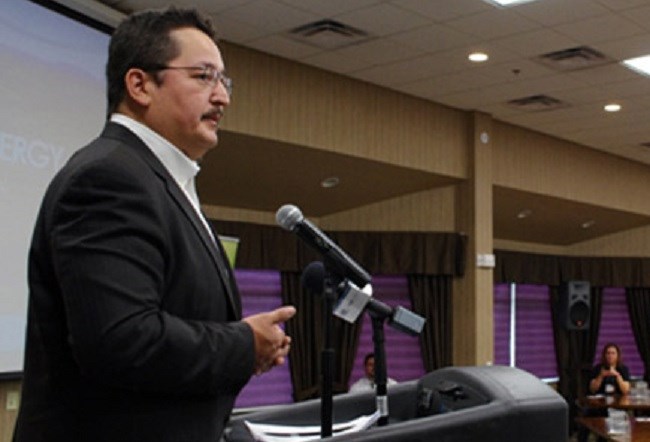Byron LeClair, an energetic and enterprising Northern leader in First Nation economic development, died suddenly on July 26.
The member of Biigtigong Nishnaabeg (formerly Pic River First Nation) was 49. He was buried Aug. 1 in the Pic River cemetery.
For more than 27 years, LeClair served as president and CEO of Pic River Energy and Forestry, a community-owned resource development company, on the North Shore of Lake Superior.
He steered the growth of this venture to three hydro-electric generating stations with assets valued at $125 million.
“It is such a tragic loss of a real economic development dynamo,” said Anishinabek Nation Grand Council Chief Patrick Madahbee in a July 28 statement.
“Byron did so much for his community whether he was serving on chief and council or trying to grow the economic development locally or on a larger scale. He did so much for the economic development in his community from hydro projects, to forestry, to mining. He was truly one of the most dynamic economic development advocates I have ever seen.”
“My deepest condolences go to his wife Rhonda, all of his children and grandchildren, but also to his friends, business partners, and fellow community members. He will surely be missed by all who had the pleasure of knowing him.”
An influential figure in the formulation of Ontario’s energy procurement policies, LeClair worked with five neighbouring communities to partner in a transmission line project.
He was also active politically, serving as chief and councillor to his home community for eight years.
Before leaving his post with Pic River in April 2016 to pursue a consulting career, LeClair helped established Mkwa Timber, the band’s fledgling forestry company to begin harvesting wood off its traditional land with the aim to start supplying area forestry mills.
In 2016, LeClair established First Nations Resource Management, offering advice to First Nation communities engaged in resource projects to ensure they received an equitable share of benefits from development occurring on their traditional territories.
LeClair also partnered with Paul Giles and Melissa Hardy-Giles at Thunder Bay-based Origin Operators and Recruitment, an Indigenous labour supply company providing mining and construction companies with a single window solution for First Nations employment engagement.
A staunch advocate of Indigenous rights, LeClair frequently spoke at conferences on the benefits of First Nation business partnerships in resource development projects.
He believed that the road to self-sufficiency and prosperity for First Nations must be generated from within and supported through “prudently negotiated strategic partnerships,” according to his bio on the Canadian Council for Aboriginal Business website.
“I have often spoken about the necessity for communities to change their frame of mind from economies reliant on government transfer payments to wealth creators, wealth generators, and masters of their own economic destinies,” wrote LeClair in an August 2016 blog post.
“It is a fools dream to think that First Nations problems will be solved by a department in Ottawa, and many communities have already heeded that message.”




